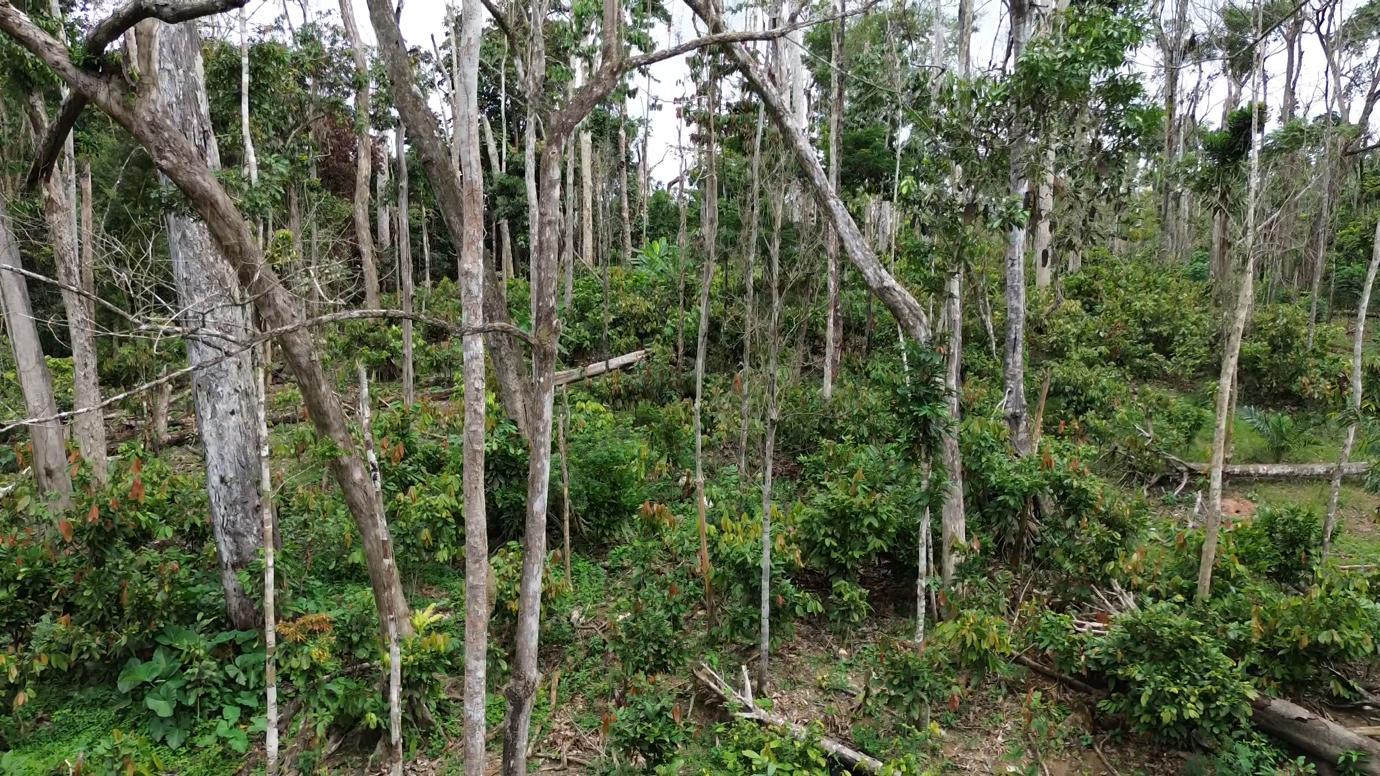Africa-Press – Liberia. screengrab of a drone video showing a portion of cocoa farm in Bargblor, Cavala District in Grand Gedeh County. The DayLight/Carlucci Cooper
The Liberia Land Authority has charged two communities in Grand Gedeh County US$11,900 to cut their boundary, dragging a dispute over Burkinabe cocoa farmers.
Early last year, Bargblor and Tojallah in the Gbao and Cavalla Districts started a boundary dispute involving Burkinabé cocoa farmers. After a police probe and a court intervention, the matter was passed to the Land Authority for a settlement, which imposed the fee.
The majority of the money covers transportation, allowance and data collection, and administrative costs, according to an estimated budget obtained by The DayLight.
Townspeople in Bargblor said they paid US$500 against the charge, but presented no evidence. Those in Tojallah, on the other hand, said they had paid US$170 for “registration, transportation and mediation” to Daniel Togbasie, County Land Dispute Officer.
“They told us we had to pay a hundred US dollars each just for them to listen to us,” said Peter Carr, a Tojallah elder. “That’s just to hear the case, not even to get the survey done. And now, they want us to cough out nearly US$12,000 before they can even step on our land.”
The charge is inconsistent with the Land Rights Act, which puts the responsibility for boundary harmonization on the government. The law was passed in 2018, granting customary communities ownership of their ancestral territories, ending decades of marginalization. However, neither Tojallah nor Bargblor has established their boundaries, a crucial part of the law.
Campaigners, who have seen the document, said the Land Authority was pricing the communities out of their rights.
“Yes, it’s true the Land Authority charges fees to carry out customary land activities under the fees and regime, but it’s wrong to charge customary communities this much,” said Alphonso Henries, the coordinator for NGOs working on land reform in Liberia.
“The law is intended to build the economic strength of the people and not to deprive them. The Land Authority’s action was wrong and hasty. I think they went too far to exploit the situation,” added Henries.
The Liberia Land Authority has charged Tojallah and Bargblor US$11,900 to resolve their dispute.
Togbasi and Paye Freeman, Grand Gedeh’s Acting Land Administrator, who approved the charge, said they were not authorized to speak on the matter. Kweshie Tetteh, the Land Authority’s communication director, who has that authorization, justified the charge in a Monrovia interview.
“Tojallah and Bargblor are not just a case of customary land formalization,” said Tetteh. “This is a dispute referred from the court. In these instances, we don’t follow the customary process, so the payment responsibility falls on both parties.”
Tetteh added that Tojallah and Bargblor were not project communities and that the Land Authority did not have funding for formalization activities. “The fees could even be higher than this, depending on the size of land and workload,” Tetteh said. He added that the Land Authority, which has US$1,715,260 in the current National Budget, had no money for customary land processes, except for donations.
But the facts contradict Tetteh’s comments. The Land Rights Act Regulation does not mention fees for any activities, except for a “reasonable” amount that communities determine. In the last five years or so, the Land Authority has been drafting a fees regime, but has yet to complete the process. Even so, the breakdown of the US$11,900 is inconsistent with the draft fees regime seen by The DayLight.
The budget the Land Authority’s Grand Gedeh Office presented includes: US$6,300 for allowance for employees, US$2,000 for survey, US$1,200 for Monrovia-based personnel transportation and US$1,600 for administrative costs. This is a far cry from the US$50 and US$100 for most transactions in the draft fees regime.
“To ask communities to pay any money outside of the law can be interpreted as an attempt to deprive communities of their deeds,” said Daniel Wehyee, the lead land rights campaigner at the Sustainable Development Institute (SDI).
“If the Land Authority says communities need to pay money before intervening in boundary disputes, then it means the Land Authority is undoing, is undermining the implementation of the Land Rights Act.”
Furthermore, Tetteh’s suggestion that the court case erases the communities’ customary profile is misleading. Alternative dispute resolution (ADR) also applies to customary communities, meant to prevent or resolve land conflicts. It was the fear of these conflicts causing Liberia’s next civil conflict that led to the establishment of the Land Authority.
Stalled
The Tojallah-Bargblor dispute started when men of Tojallah abducted a group of Burkinabe farmers working for Bargblor on a farmland in a place called Karblee. Local people are hosting Burkinabes to plant cocoa in a cross-border joint venture. As of last month, the Liberia Immigration Service registered over 36,000 Burkinabes in Grand Gedeh alone.
Tojallah claims Burkinabés working for Bargblor crossed the Thwanee Creek, their boundary with Bargblor. On the other hand, Bargblor insists that the creek falls within their traditional territory and that the true boundary was Dulee, further into Tojallah.
After several failed mediation attempts, Bargblor filed a complaint with the police, which jailed a host of Tojallah townsmen. Later, the matter was forwarded to the Zwedru Magisterial Court, which then transferred the matter to the Land Authority for settlement.
elevated view of the Thwanee Creek, which Tojallah argues is the boundary with Bargblor. Their neighbors, however, disagree, sparking a yearlong dispute. The DayLight/Carlucci Cooper
“Most of the cases we receive are customary land cases, so we forward them to the Land Authority with an arbitration team, who will establish who the rightful owner of the land is. And we’ve been able to achieve this with the help of the community leaders,” said T. Shad Dweh, Senior Associate Magistrate.
The Land Authority’s excessive request has dragged the dispute, with tensions flaring in the area. People from both sides of the conflict accuse the other of spoiling their crops and people fear walking alone in an area known for intermarriages.
For More News And Analysis About Liberia Follow Africa-Press






